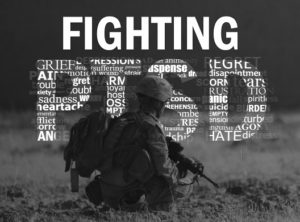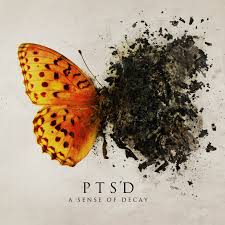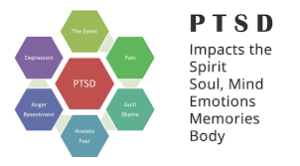In honor of all men and women who have served our country thank you!! I understand commitment, I myself am in caring for people. as a RN 32 this month and for the commitment you have made in keeping the USA safe, with any sacrifices you made, from the bottom of my heart thank you!! I dedicate this article to all acting and retired veterans. Happy Memorial Day weekend to all.
PTSD-Post traumatic stress disorder

Post-traumatic stress disorder (PTSD) is a mental health condition that’s triggered by a terrifying event — either experiencing it or witnessing it. Symptoms may include flashbacks, nightmares and severe anxiety, as well as uncontrollable thoughts about the event.
Many people who go through traumatic events have difficulty adjusting and coping for a while, but they don’t have PTSD — with time and good self-care, they usually get better. But if the symptoms get worse or last for months or even years and interfere with your functioning, you may have PTSD.
Getting effective treatment after PTSD symptoms develop can be critical to reduce symptoms and improve function.
The Mayo clinic states you can develop post-traumatic stress disorder when you go through, see or learn about an event involving actual or threatened death, serious injury or sexual violation.
Doctors aren’t sure why some people get PTSD. As with most mental health problems, PTSD is probably caused by a complex mix of:
- Inherited mental health risks, such as an increased risk of anxiety and depression
- Life experiences, including the amount and severity of trauma you’ve gone through since early childhood
- Inherited aspects of your personality — often called your temperament
- The way your brain regulates the chemicals and hormones your body releases in response to stress.
- Posttraumatic stress disorder, or PTSD, can occur after someone goes through, sees, or learns about a traumatic event like: Combat exposure, Child sexual or physical abuse, Terrorist attack, Sexual/physical assault, Serious accident, Natural disaster, which can occur during areas of war or not.
- Most people have some stress-related reactions after a traumatic event. If your reactions don’t go away over time and they disrupt your life, you may have PTSD. During a traumatic event, you think that your life or others’ lives are in danger. You may feel afraid or feel that you have no control over what is happening around you. Most people have some stress-related reactions after a traumatic event; but, not everyone gets PTSD. If your reactions don’t go away over time and they disrupt your life, you may have PTSD.
-How intense the trauma was or how long it lasted (the injury) or how long the loss of someone important to you has been all plays a part.’
-How close are you were to the event (bombing where you saw a friend blow up in pieces for example.)
-How much help and support you got after the event. PTSD symptoms usually start soon after the traumatic event, but they may not appear until months or years later. They also may come and go over many years. If the symptoms last longer than four weeks, cause you great distress, or interfere with your work or home life, you might have PTSD.
Whether or not you get PTSD depends on many things. Most people who go through a trauma have some symptoms at the beginning. Only some will develop PTSD over time. It isn’t clear why some people develop PTSD and others don’t.
What some people show in their behavior or go through with PTSD:
- Reliving the event (also called re-experiencing symptoms)
- You may have bad memories or nightmares. You even may feel like you’re going through the event again. This is called a flashback.
- Avoiding situations that remind you of the event
- You may try to avoid situations or people that trigger memories of the traumatic event. You may even avoid talking or thinking about the event.
- Negative changes in beliefs and feelings
- The way you think about yourself and others may change because of the trauma. You may feel fear, guilt, or shame. Or, you may not be interested in activities you used to enjoy. This is another way to avoid memories.
- Feeling keyed up (also called hyperarousal) People with PTSD may also have other problems. These include:
- What other problems do people with PTSD experience?
- You may be jittery, or always alert and on the lookout for danger. Or, you may have trouble concentrating or sleeping. This is known as hyper-arousal.
For many Veterans, memories of their wartime experiences can still be upsetting long after they served in combat. If you are an older Veteran, you may have served many years ago, but your military experience can still affect your life today.
Common symptom patterns:
*Some Veterans begin to have PTSD symptoms soon after they return from war. These symptoms may last until older age. Other Veterans don’t have PTSD symptoms until later in life.
*For some Veterans, PTSD symptoms can be high right after their war experience, go down over the years, and then worsen again later in life.
*Many older Veterans have functioned well since their military experience. Then later in life, they begin to think more or become more emotional about their wartime experience. As you age, it is normal to look back over your life and try to make sense of your experiences. For Veterans this process can trigger Late-Onset Stress Symptomatology (LOSS). The symptoms of LOSS are similar to symptoms of PTSD. With LOSS, though, Veterans might have fewer symptoms, less severe symptoms, or begin having symptoms later in life.
*The wars in Afghanistan and Iraq are the longest combat operations since Vietnam. Many stressors face these Operation Enduring Freedom/Operation Iraqi Freedom (OEF/OIF) troops. OEF/OIF service members are at risk for death or injury. They may see others hurt or killed. They may have to kill or wound others. They are on alert around the clock. These and other factors can increase their chances of having PTSD or other mental health problems.
*For many service members, being away from home for long periods of time can cause problems at home or work. These problems can add to the stress. This may be even more so for National Guard and Reserve troops who had not expected to be away for so long. Almost half of those who have served in the current wars have been Guard and Reservists.
*MST-Military Sexual Trauma is the term used by the Department of Veterans Affairs (VA) to refer to experiences of sexual assault or repeated, threatening sexual harassment that a Veteran experienced during his or her military service. Another cause of stress in Iraq and Afghanistan is military sexual trauma (MST). This is sexual assault or repeated, threatening sexual harassment that occurs in the military. It can happen to men and women. MST can occur during peacetime, training, or war.
In many cases, treatments for PTSD will also help these other problems, because they are often related. The coping skills you learn in treatment can work for PTSD and these related problems.
COMMON SIGNS AND SYMPTOMS OF PTSD: Anger and irritability, guilt, shame, or self-blame, substance abuse, feelings of mistrust and betrayal, depression and hopelessness, suicidal thoughts and feelings, feeling alienated and alone, & physical aches and pains. Also employment and relationship problems.

